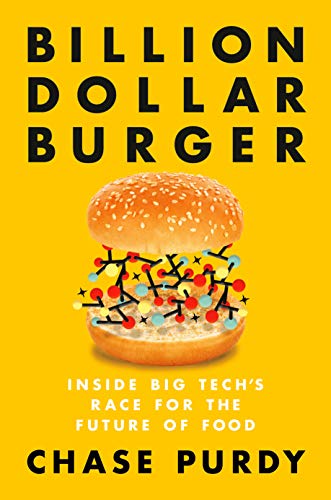Customer Services
Copyright © 2025 Desertcart Holdings Limited


Portfolio Billion Dollar Burger: Inside Big Tech's Race for the Future of Food
R**
High School Literature Class prize winner. Absolutely ghastly.
A very very poor book. An airport bookshop book of the worst kind. Stuffed with high-school literature class “filler” - if ruthlessly edited, it may have made a reasonably good article in a newspaper. Sadly the author clearly felt he “had a book in him” and puffed out one.Ghastly.
B**O
Million dollars burger
Great eye opener regarding the amount of resources to feed all meat animals that humans and the obvious destruction it overloads Mother Nature with it. Should b part of school curriculum...
読**ン
興味深い一冊
細胞から肉を作るベンチャー企業の話。Cell-cultured meat の歴史も同時に知る事ができる。今後の食肉業界について、環境問題を考えるにあたり、読んでおくべき本だと思う。
W**R
Focuses entirely on cultured meat
Cell-cultured meat grown from animal tissue is the entire focus of this book. Companies like Beyond Meat and Impossible Burger are dismissed and their contribution to reducing the consumption of meat by consumers is ignored completely. Also ignored is the deletereous effect of animal protein in the human diet.The author attributes Michael Pollen with the comment that people have always eaten meat which he may have said but if he did then he was mistaken. It has been shown that paleo man was a vegetarian based on excavations that found grains but no bones. It also ignores the research from the past 25 years that have shown how animal protein promotes the growth of cancer tissues in humans and the resulting increases in child brain, breast, and colorectal cancer that correlate exactly with meat consumption. For the test with lab animals the animal protein was in the form of whey from the milk of cows. There is not reason to think that cultured meat is going to be any different in promoting this cancer cell response in humans.The author also does not understand how animals are slaughtered to qualify as being kosher. Calves that are killed in the kosher manner are drained of their blood while hanging by a chain fastened to their hind feet and while still alive. Nothing is less humane than "kosher" meat or meat products.In the book, Tetrick, the founder of JUST foods goes to the Netherlands to try to sell his cultured meat and neither the author or this individual realized how stupid this was to attempt. The Netherlands is the world's second largest producer of meat and dairy after the United States. This country has only in the past year moved to reduce the number of cows, pigs, and chickens raised in the country to reduce global warming from the greenhouse gases but also to reduce the amount of land and water polution caused by the animals excreta including urine.The author is unaware of how heavily subsidized the meat and dairy industry is in the United States and other countries. In the U.S. the federal subsidies are in the billions of dollars and are far greater than for the energy companies. Fruit and produce growers enjoy no such subsidies which is why these healthy foods cost consumers so much more than unhealthy foods like meat and dairy.There is an immediate need to reduce the consumption of animal products and culturing animal cells is not the answer. It will always be a novelty product in the markets, unlike Beyond Meat which is already widely sold in U.S. supermarkets and fast food stores.A better book would be one that covers the massive government subsidies of the meat and dairy industry and their efforts to stop any competitors from selling plant based milk or mayo or eggs or sausages as well as the gag laws that keep individuals from reporting on the abhorant conditions in slaughter houses for the animals and the workers. Few people realize that all livestock (calves, chickens, pigs, etc.) is exempt from the animal cruelty laws and so anything goes in the United States.
B**1
Might as well be a promotional brochure
This is the first time I have felt compelled to write a review of a book purchased through Amazon. The book is nothing more than a 232 page paean to this secretive, self-glorifying industry, centered around the author's crush on Josh Tetrick. The author only glancingly addresses the problem that not a single one of the subject companies is willing to disclose the contents of the chemical soup required to produce this "meat." (Trust Us! It's Safe!) More problematically, the entire premise of the story assumes, without evidence, that this chemical, industrial production of meat will be environmentally 'better' than conventional mechanisms. In fact, in one of my favorite anecdotes, told at pages 45-46, a researcher on the topic found, in a 2018 study, that energy consumption from the production of "cell-culturing meat" would be four times higher than she found in her prior, 2011 study. The researcher deliberately withheld publication of the 2018 numbers because she didn't want the public to 'misunderstand' the 'nuances' of her findings and harm the fledgling industry (!?!?!). The author acknowledges (as he must) that the industry's claims as "an environmental godsend" should be "taken with a grain of salt," yet the entire remainder of the book rests its support of chemical meat on curbing global warming. The author's lack of objectivity, and his blind parroting of the self-interested claims of this industry and its charismatics, is the same mindset that gave rise to Silicon Valley luminaries such as Juul and Theranos.
Trustpilot
2 months ago
5 days ago
1 month ago
3 weeks ago